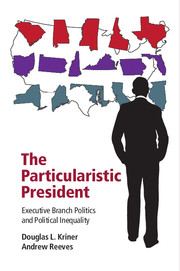Book contents
- Frontmatter
- Contents
- List of Tables
- List of Illustrations
- Acknowledgments
- 1 Introduction
- 2 The Origins of Presidential Particularism
- 3 Base Closings and Trade
- 4 Disaster Declarations and Transportation Grants
- 5 Federal Grants and Presidential Particularism
- 6 The Electoral Rewards of Presidential Particularism
- 7 Conclusion
- Appendix A Technical Appendix to Chapter 3
- Appendix B Technical Appendix to Chapter 4
- Appendix C Technical Appendix to Chapter 5
- Appendix D Technical Appendix to Chapter 6
- References
- Index
5 - Federal Grants and Presidential Particularism
Published online by Cambridge University Press: 05 June 2015
- Frontmatter
- Contents
- List of Tables
- List of Illustrations
- Acknowledgments
- 1 Introduction
- 2 The Origins of Presidential Particularism
- 3 Base Closings and Trade
- 4 Disaster Declarations and Transportation Grants
- 5 Federal Grants and Presidential Particularism
- 6 The Electoral Rewards of Presidential Particularism
- 7 Conclusion
- Appendix A Technical Appendix to Chapter 3
- Appendix B Technical Appendix to Chapter 4
- Appendix C Technical Appendix to Chapter 5
- Appendix D Technical Appendix to Chapter 6
- References
- Index
Summary
In 1909, President William H. Taft began his public appeal for a massive expansion and improvement of American waterways with a flotilla down the Mississippi River. The convoy included nearly one hundred members of Congress and was, in part, an early twentieth-century publicity stunt designed to garner support for infrastructure improvements legislation. But the president also used the public spectacle as a powerful platform from which to warn Congress not to treat the initiative as pork barrel legislation. Taft “caused a sensation” among members, especially Speaker of the House Joe Cannon, for criticizing Congress for doing what was politically expedient to the detriment of the general welfare. If the local interests of members of Congress caused them to invest in strengthening already solid riverbanks and deepening untraveled waterways in their districts, the collective aims of the nation would suffer. Taft demanded that funds be allocated based on objective need and not the wants of powerful members of Congress.
More than a century later, modern presidents still echo Taft's warnings. Presidents continue to rail against pork barrel spending and to champion the office of the presidency as the defender of the national interest from petty and parochial politics. At times, members of Congress seem to acknowledge their own failings and look to the president to save them from themselves. Witness the Line Item Veto Act of 1996, which gave presidents the power to strike certain types of provisions from legislation individually rather than veto the entire bill. While the Supreme Court struck down the line item veto as unconstitutional in 1998, both George W. Bush and Barack Obama have called for its reintroduction in a form that might pass constitutional muster. Most recently, in 2010 the Obama administration submitted a new proposal to Congress, the Reduce Unnecessary Spending Act, which the president claimed would help his administration cut billions of dollars of federal waste inserted into appropriations bills by spendthrift members of Congress each year.
- Type
- Chapter
- Information
- The Particularistic PresidentExecutive Branch Politics and Political Inequality, pp. 110 - 146Publisher: Cambridge University PressPrint publication year: 2015

